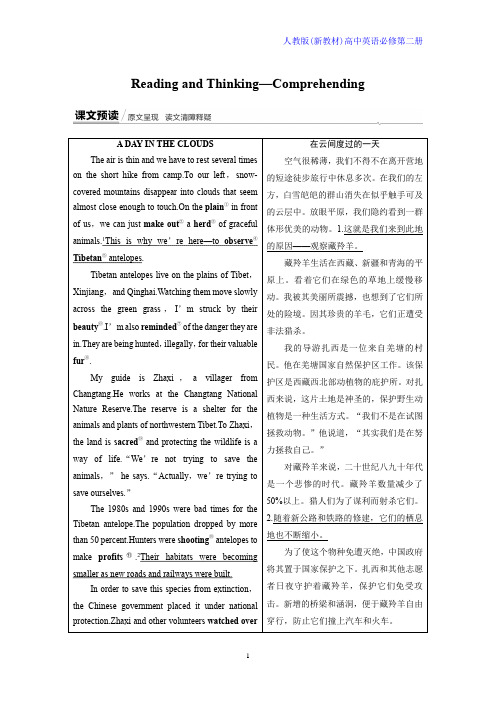新教材英语必修二UNIT 2 Reading and Thinking—Comprehending
人教版(2019)高中英语必修第二册教学设计

【原创教学】人教版新教材必修二Unit Two Wildlife ProtectionReading and Thinking一、课例背景1. 文本解读本课例选自人教版高中新教材必修二Unit2 Reading and Thinking —— Wildlife Protection。
本单元的中心话题是目前全世界都相当关注和重视的野生动物的保护。
该主题语境属于三大主题语境“人与自我、人与社会、人与自然”中的“人与自然”这一大类,并从属于该语境下“环境保护”主题群。
该主题语境为语言学习提供了有关人与自然、人与动植物的意义语境,并有机渗透情感、态度和价值观。
众所周知,自然界是一个复杂的生态系统,生存其中的动植物之间存在着微妙的平衡关系。
任何一个物种的灭绝都会对这种平衡产生影响,大规模的物种灭绝会对生态系统产生严重甚至不可逆转的影响,由此会造成巨大的损失。
因此,保护野生动植物和人类可持续发展息息相关,正如文中志愿者扎西所言,保护野生动植物就是保护人类自己,也是保护人类赖以生存的星球。
在处理文本的过程中,笔者用人类和自然两条线贯穿全文,人类线以扎西视角代入我的意识,然后从个体上升到群体,最终上升为整个人类;自然线以藏羚羊为切入点,引出野生动植物,在进一步扩展为自然,最终落脚点为整个星球,然后将两条线索串联在一起,构成了人与自然的和谐统一,即:Zhaxi I We Human beingsHarmonyTibetan antelope wildlife nature planet2. 课型解读本课例所涉及的板块课型是Reading and Thinking,本板块的活动主题是“学习保护濒危动物”,主要讲述了我国保护珍稀野生动物藏羚羊的措施和取得的成就。
阅读文本“A Day in the Clouds”通过介绍藏羚羊过去和现在的生存环境,倡导每个个体通过自身生活方式的改变,学会与自然、野生动植物和睦相处,学会保护、尊重野生动植物,以此来消除人类对野生动植物存在的威胁,最终达成人和自然的和谐共生。
(2020新教材)新人教版高中英语必修第二册UNIT 2 课时跟踪检测(二) Reading and Thinking

课时跟踪检测(二)Reading and Thinking一、语言基础训练Ⅰ.单词拼写1.This kind of antelope (羚羊) has long ears, looking rather like a donkey.2.The story is written in plain (简单明了的) English.3.I noticed a herd (兽群) of cattle coming.4.Scientists have been exploring whether life exists (存在) on other planets.5.He succeeded in recovering (恢复) from a leg injury.6.The number of visitors is bringing a threat (威胁) to the area.7.We will stand up and hold together always as one family in harmony (和谐).8.Small as it is, the ant is also a creature (生物) on earth.9.The valley is considered as an area of outstanding natural beauty (美).10.He had an operation to remove (除去) a nail in his chest.Ⅱ.单句语法填空1.I've got a reservation (reserve) for two nights.2.It's difficult to make out what he says.3.Her hand was_observed (observe) to shake.4.The boy was enjoying the beauty (beautiful) of nature.5.The taxi driver often reminds passengers of their belongings when they leave the car.6.He enjoys riding, fishing and shooting (shoot).7.They started an attack against each other with sharp words.8.In order to avoid traffic jams, I strongly suggest some effective_ (effect) measures be taken. 9.Unattended luggage will be_removed (remove) and may be destroyed.10.(2018·北京高考书面表达) The university is known for its language and culture courses intended (intend) for international students.Ⅲ.选词填空I could hear voices but I couldn't make_out what they were saying.2.In the past, poor workers worked day_and_night,_but they still lived a hard life.3.He is very ill, and needs someone to watch_over him all the time.4.The police had orders to shoot_at anyone who attacked them.5.She can remind me of something important, such as exams and even my birthday.6.The government should call on people to live in_harmony_with nature.Ⅳ.完成句子1.Watch_out_for the haze; it may do great harm to us.当心这种雾霾天气,它可能对我们造成很大损害。
新人教必修二 Unit 2 Reading And Thinking

• They are graceful/beautiful animals.
• They have valuable fur.
Whyቤተ መጻሕፍቲ ባይዱ
What
• Their population dropped. • They are being hunted were
to make profits. • Their habitats were getting
valuable fur.
Main idea (Para. 3) What the writer learned about the
reserve Details: His guide, Zhaxi, a villager, works at the reserve. It is a shelter for the animals and plants of northwestern Tibet. The land is sacred. Protecting the wildlife is a way of life. Saving the animals is actually saving ourselves.
the protection programmes, since the threats to the animals have not yet disappeared.
Main idea (Para. 7)
The writer's reflection on what he saw and learned on his visit
Pre-reading
1. Before you read, discuss these questions in pairs.
Unit 2 Reading and Thinking 课文分析课件高中英语人教版选择性必修第二册

have to get used to a whole new life.” she said. I had to learn how to use public transport and how to ask for things I didn’t know the English names for. When I got lost,I had to ask passers-by for
and friends and boarded a plane for London. It was the first time
that she had left China. “I was very excited but also quite nervous. I
didn’t know what to expect,” Xie Lei recalled.
பைடு நூலகம்
(that 引导的宾语从句, that 在引导第一个宾语从句时可以省略,此处为省略; when she smells it 为 when 引导的时间状语从句 ) , so I taught her how to cook it (teach sb sth 双宾语 结构,意为教某人做某事 )
(the first time (that) ... 充当连词,引导时间状语从句 ) ( explained 后跟两个 that 引导的宾语从句,其中从句 what other people had said 作 acknowledge 的宾语 , what she thought 作 know 的宾语 )
(which/that 引导的定语从句用于修饰前面的名词 words , which 在定语从句中 做宾语时可以省略,此处为省略现象 短语: be familiar with 对 ... 熟悉 )
Unit 2 Reading and Thinking 课文讲解课件-高中英语人教版选择性必修第二册

n.木板;板 blackboard 黑板 董事会;理事会 on board 在船/飞机/火车上
2. It was the first time that she had left China.
这是她第一次离开中国。
It was the first/second time that sb had done sth 某人第几次做某事that 从句要用完成时态
她说,“我得学会使用公共交通,学会要到我不知道英文名称的东西。
句中and连接的两个 “疑问词+不定式短语”作 learn的宾语.
括号部分是省略了关系词that或which的定语从句。
7.When I got lost, I had to ask passers-by for help, but people here speak fast and use words (I’m not familiar with). I ask them to repeat themselves a lot!”
起初,谢蕾不得不去适应异国他乡的生活。“你必须习惯全新的生活。
adapt (oneself) to 适应... adapt sth for sth 把...改编成..
Three of his novels have been adapted for television.
他有三部小说已被改编成电视剧。
高二英语选择性必修第二册(2020版)_Unit2_Reading_and_Thinking_知识点

[知识拓展]
(1)make an adaptation to... 适应……
(2)adapt vi.& vt.
(使)适应;(使)适合
vt.
改编;修改
adapt to...
适应……
adapt oneself to...
使某人自己适应……
adapt sth. for/into...
把……改编成……
adapt sth. from...
[知识拓展]
(1)in comfort
舒适地;放松地
be a comfort to sb. 对某人来说是个安慰
It's a comfort to do sth. 做……是令人安慰的事
(2)comfort sb.=give comfort to sb. 安慰某人
(3)comfortable adj. 舒服的;安逸的 (4)comfortably adv. 舒适地 (5)uncomfortable adj. 不舒适的
[知识拓展]
(1)participation in
参加;参与
(2)participate vi.
参加;参与
participate in (doing) sth. with sb. 与某人一起参加/参与做某事
participate with sb. in sth. 与某人分担某事
(3)participant n.
[知识拓展] speak for speak one's mind speak well/ill of speak of
代表……讲话;为……辩护 说出心里话 表扬/批评 谈起;提到
[即学即练] 单句语法填空/完成句子 ①What have you to speak for yourself? ②They spoke of the old days on the campus. ③We should not speak ill of others behind their backs. 我们不应该在背后说别人的坏话。
新人教高中英语必修二Unit2ReadingandThinking-ADayinThe Clouds

Predicting for possible information
1.What’s the type of writing of the text? travel journal
2.What’s the text probably about? The pictures are of antelopes, so
Skimming for main ideas
Read the text again and summarize the main idea of each paragraph.
Para 1
The writer visited Changtang in order to observe Tibetan antelopes.
Para 2
Tibetan antelopes are in danger.
Para 3
His guide thinks that the land is sacred and protecting the wildlife is a way of life.
Para 4 Para 5 Para 6
The writer thinks our modern life goes against nature, because he says we must change the way we live if we really want to protect wildlife and the planet.
_I__ We should not buy goods made from endangered animals. Implied by “They were being hunted illegally, for their valuable fur ” and “Hunters were shooting antelopes to make profits
英语必修2Unit 2学案:Reading and Thinking—Comprehending

Reading and Thinking—Comprehending①plain/ple I n/n.平原adj.简单明了的;直率的;平凡的②make out看清;听清;分清③herd/hɜːd/n.牧群;兽群④observe/əb′zɜːv/v t.观察(到);注视;遵守⑤Tibetan/t I′betn/adj.西藏的;藏语的;藏族(人)的n.西藏人;藏族人;藏语Tibet/t I′bet/n.西藏⑥beauty/′bjuːt I/n.美;美人;美好的东西⑦remind/r I′ma I nd/v t.提醒;使想起remind sb.of sb./sth.使某人想起某人或某物⑧fur/fɜː/n.毛(皮);毛皮衣服⑨sacred/′se I kr I d/adj.神圣的;受尊敬的⑩shoot/ʃuːt/v t.& v i.(shot,shot)射杀;射伤;发射⑪profit/′prɒf I t/n.利润;利益⑫watch over保护;照管;监督⑬day and night日日夜夜;夜以继日⑭attack/ə′tæk/n.,v i.& v t.攻击;抨击⑮effective/I′fekt I v/adj.有效的;生效的⑯recover/r I′kʌvə(r)/v i.恢复;康复v t.找回;寻回⑰remove/r I′muːv/v t.去除;移开;脱去⑱intend/I n′tend/v i.& v t.打算;计划;想要⑲threat/θret/n.威胁threaten/′θretn/v t.威胁;危及⑳exist/Iɡ′z I st/v i.存在;生存○21harmony/′hɑːməni/n.和谐;融洽Step 1Fast-readingⅠ.Read the passage quickly and fill in the following blanks with suitable words.Ⅱ.The passage is mainly about what human beings do for wild animals.Step 2Careful-readingⅠ.Judge whether the following statements are true (T) or false (F).1.Antelopes mainly live on snow-covered mountains.(F)2.The Changtang National Nature Reserve is a shelter for the animals and plants of southwestern Tibet.(F)3.During the 1970s and 1990s,a large number of antelopes were hunted and their habitats became smaller for heavy pollution.(F)4.Many parks and gates were added to let the antelopes move easily and keep them safe from cars and trains.(F)5.Only when we human beings learn to exist in harmony with nature can we stop being a threat to wildlife and to our planet.(T)Ⅱ.Choose the best answer.1.What’s the purpose of the author’s visit to the Tibet?A.He wants to go on a hike.B.He wants to climb mountains that soar into the clouds.C.He wants to see beautiful scenery in that place.D.He wants to observe Tibetan antelopes.〖答案〗D2.Which of the following places is NOT the habitat of the Tibetan antelope?A.The plains of Tibet.B.The mountainous area of Tibet.C.The plains of Xinjiang.D.The plains of Qinghai.〖答案〗B3.How has the situation of the Tibetan antelope improved after the government took protection? A.The habitat area of the Tibetan antelope has expanded a lot.B.The population of the Tibetan antelope has recovered.C.The Tibetan antelope is no longer listed as an endangered animal.D.The threats to the Tibetan antelope have disappeared.〖答案〗B4.According to the author’s point of view,how can we really save the earth?A.We must try our best to protect wildlife.B.We must do more in environmental protection.C.We must change our way of life.D.We must remove all threats to wildlife.〖答案〗C5.What is the author’s attitude towards the wildlife protection?A.Negative. B.Supportive.C.Doubtful. D.Unclear.〖答案〗BStep 3Post-readingⅠ.After reading the passage,please fill in the following blanks.A Day in the CloudsTo observe Tibetan antelopes,we came to Tibet.There we made out 1.a herd of graceful animals and were struck by their beauty.I 2.was reminded(remind) of the danger they are in.They are beinghunted 3.illegally(illegal) for their valuable fur.To protect them,the Changtang National Nature Reserve was set up,4.which is a shelter for the animals and plants of northwestern Tibet.In the 1980s and 1990s,the population dropped badly because of being shot to make profits and the loss of 5.their(they) habitats.In order to prevent this species from 6.extinction(extinct),the Chinese government took effective 7.measures(measure) to place it under national protection.Its population has recovered and it was removed from the 8.endangered(danger) species list.However,the government didn’t intend 9.to give(give) up the protection programs.To save wildlife,we should learn to exist 10.in harmony with nature.Ⅱ.Discuss with your partner and then answer the following questions.1.What reasons may cause the decline of wildlife?2.What should people do if wildlife protection is to succeed?Step 4Sentence-learning1.To our left,snow-covered mountains disappear into clouds that seem almost close enough to touch.〖句式分析〗本句是复合句。
- 1、下载文档前请自行甄别文档内容的完整性,平台不提供额外的编辑、内容补充、找答案等附加服务。
- 2、"仅部分预览"的文档,不可在线预览部分如存在完整性等问题,可反馈申请退款(可完整预览的文档不适用该条件!)。
- 3、如文档侵犯您的权益,请联系客服反馈,我们会尽快为您处理(人工客服工作时间:9:00-18:30)。
Period Two Reading and Thinking—Comprehending①plain/ple I n/n.平原adj.简单明了的;直率的;平凡的②make out看清;听清;分清③herd/hɜːd/n.牧群;兽群④observe/əb′zɜːv/v t.观察(到);注视;遵守⑤Tibetan/t I′betn/adj.西藏的;藏语的;藏族(人)的n.西藏人;藏族人;藏语Tibet/t I′bet/n.西藏⑥beauty/′bjuːt I/n.美;美人;美好的东西⑦remind/r I′ma I nd/v t.提醒;使想起remind sb.of sb./sth.使某人想起某人或某物⑧fur/fɜː/n.毛(皮);毛皮衣服⑨sacred/′se I kr I d/adj.神圣的;受尊敬的⑩shoot/ʃuːt/v t.& v i.(shot,shot)射杀;射伤;发射⑪profit/′prɒf I t/n.利润;利益⑫watch over保护;照管;监督⑬day and night日日夜夜;夜以继日⑭attack/ə′tæk/n.,v i.& v t.攻击;抨击⑮effective/I′fekt I v/adj.有效的;生效的⑯recover/r I′kʌvə(r)/v i.恢复;康复v t.找回;寻回⑰remove/r I′muːv/v t.去除;移开;脱去⑱intend/I n′tend/v i.& v t.打算;计划;想要⑲threat/θret/n.威胁threaten/′θretn/v t.威胁;危及⑳exist/Iɡ′z I st/v i.存在;生存○21harmony/′hɑːməni/n.和谐;融洽Step 1Fast-readingⅠ.Read the passage quickly and fill in the following blanks with suitable words.Ⅱ.The passage is mainly about what human beings do for wild animals.Step 2Careful-readingⅠ.Judge whether the following statements are true (T) or false (F).1.Antelopes mainly live on snow-covered mountains.(F)2.The Changtang National Nature Reserve is a shelter for the animals and plants of southwestern Tibet.(F)3.During the 1970s and 1990s,a large number of antelopes were hunted and their habitats became smaller for heavy pollution.(F)4.Many parks and gates were added to let the antelopes move easily and keep them safe from cars and trains.(F)5.Only when we human beings learn to exist in harmony with nature can we stop being a threat to wildlife and to our planet.(T)Ⅱ.Choose the best answer.1.What’s the purpose of the author’s visit to the Tibet?A.He wants to go on a hike.B.He wants to climb mountains that soar into the clouds.C.He wants to see beautiful scenery in that place.D.He wants to observe Tibetan antelopes.答案D2.Which of the following places is NOT the habitat of the Tibetan antelope?A.The plains of Tibet.B.The mountainous area of Tibet.C.The plains of Xinjiang.D.The plains of Qinghai.答案B3.How has the situation of the Tibetan antelope improved after the government took protection? A.The habitat area of the Tibetan antelope has expanded a lot.B.The population of the Tibetan antelope has recovered.C.The Tibetan antelope is no longer listed as an endangered animal.D.The threats to the Tibetan antelope have disappeared.答案B4.According to the author’s point of view,how can we really save the earth?A.We must try our best to protect wildlife.B.We must do more in environmental protection.C.We must change our way of life.D.We must remove all threats to wildlife.答案C5.What is the author’s attitude towards the wildlife protection?A.Negative. B.Supportive.C.Doubtful. D.Unclear.答案BStep 3Post-readingⅠ.After reading the passage,please fill in the following blanks.A Day in the CloudsTo observe Tibetan antelopes,we came to Tibet.There we made out 1.a herd of graceful animals and were struck by their beauty.I 2.was reminded(remind) of the danger they are in.They are beinghunted 3.illegally(illegal) for their valuable fur.To protect them,the Changtang National Nature Reserve was set up,4.which is a shelter for the animals and plants of northwestern Tibet.In the 1980s and 1990s,the population dropped badly because of being shot to make profits and the loss of 5.their(they) habitats.In order to prevent this species from 6.extinction(extinct),the Chinese government took effective 7.measures(measure) to place it under national protection.Its population has recovered and it was removed from the 8.endangered(danger) species list.However,the government didn’t intend 9.to give(give) up the protection programs.To save wildlife,we should learn to exist 10.in harmony with nature.Ⅱ.Discuss with your partner and then answer the following questions.1.What reasons may cause the decline of wildlife?2.What should people do if wildlife protection is to succeed?Step 4Sentence-learning1.To our left,snow-covered mountains disappear into clouds that seem almost close enough to touch.[句式分析]本句是复合句。
that引导定语从句,修饰先行词clouds。
主句中snow-covered作定语,修饰mountains。
To our left为地点状语。
[自主翻译]在我们的左方,白雪皑皑的群山消失在似乎触手可及的云层中。
2.The government,however,does not intend to stop the protection programmes,since the threats to the Tibetan antelope have not yet disappeared.[句式分析]本句是复合句,since“因为”,引导原因状语从句。
however放在了主句中,表示转折关系。
[自主翻译]然而,政府并没有打算停止这些保护项目,因为对藏羚羊的威胁依然存在。
3.Much is being done to protect wildlife,but if we really want to save the planet,we must change our way of life.[句式分析]并列连词but连接两个并列分句。
